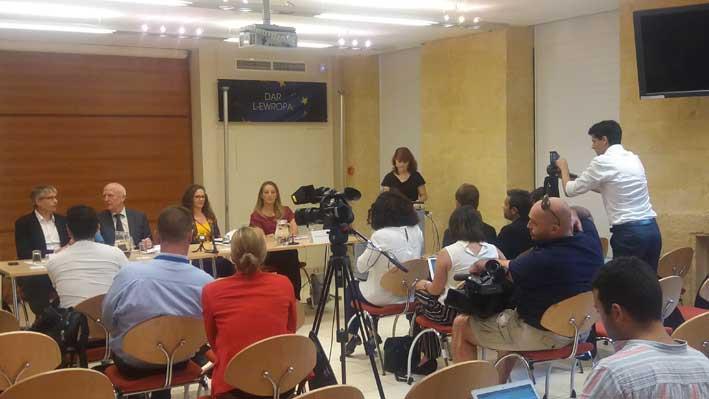The EP delegation on the rule of law had a “rather disappointing” exchange with the financial services regulator, one of the delegation members, Greens MEP Sven Giegold said on Thursday.
He was speaking at a press conference after a two-day visit, which saw the MEPs meet with activists, journalists, the Attorney General, the Chief Justice, the Financial Intelligence Analysis Unit, the Malta Financial Services Authority and the Deputy Prime Minister, among others.
Giegold said he was “not convinced that there was a new start, a new attitude at the MFSAS, on prudential regulation, consumer protection and measures to combat money laundering.”
He said the exchange was “rather disappointing,” especially in view of the fact that Malta was aiming to become a hub for crypto currencies.
He also said it was disappointing that, despite there being pieces of evidence against Konrad Mizzi and Keith Schembri, there have been no conclusions yet on the two government officials. “It is hard to imagine that in other European countries you could stay in office in such circumstances.”
The Chair of the delegation, Dutch MEP Sophie in 't Veld, said the delegation had met with the family of murdered journalist Daphne Caruana Galizia, who were still being subjected to “a lot of hatred and animosity.”
“It is very important that this stops, that everyone rallies around the monument and shows sympathy with the family,” she said.

The MEP said the delegation had asked three things of the government: to clearly and unambiguously stop all the hate speech directed at the family; to drop all libel cases against Caruana Galizia, and to find a solution about the makeshift memorial in Valletta. The government indicated that it was open to discussing the latter, she said.
Sophie in 't Veld said the delegation had met with representatives of the police and the judiciary and them to really make sure that the murder investigation is concluded as soon as possible and that those behind it are brought to justice.
It also discussed cases of corruption and the golden visa scheme – something the MEPs fear is being used as a backdoor for people “we do not necessarily want in the EU.”
“One general observation is that, although all the laws are in place, there seems to be some gap or lack of clarity or even passiveness in triggering investigations where suspicious or criminal activity is noticed. The authorities keep pointing fingers at each other.”
She also said the authorities should not be using legal reasons as obstacles for an investigation.
The MEPs also suggested to the Deputy Prime Minister to be receptive to the idea, suggested two years ago by the European Parliament, for there to be a broad rule of law mechanism – a sort of health check – for all member states.

The second suggestion was to invite an expert committee from the Council of Europe to come to Malta, take look at its systems and make its recommendations for improvement.
The MEP said the delegation was sometimes accused of singling Malta out. She explained that, as a member state, what happens in Malta can have an effect on the other member states.
She also believes that the police should have interviewed politicians with regard to the Caruana Galizia murder. In Slovakia, she said, the police started with some 30 hypothesis, eventually narrowing the number down to two. But in Malta, certain hypotheses were automatically excluded.
Asked about the Egrant report, in 't Veld said the entire document should be published. “It is in the interest of democracy that people know what’s in the report. Sensitive parts could be blacked out, but seeing that there is so much unrest, the report should be made public.”
The delegation, which also includes PN MEP Roberta Metsola and Austrian MEP Josef Weidenholzer (S&D), has been criticised as being one-sided. Critics, mainly coming from the government and Labour Party, have criticised the fact that a Nationalist MEP is sitting on the delegation.
Asked about this during the press conference, Metsola invited the reporter to ask Konrad Mizzi why he had refused to meet with the MEPs.
Sophie in 't Veld continued: “I have seen the statements made by an EP colleague (MEP Miriam Dalli), who has never spoken to me. I invite her to speak to me. The members of this delegation come from every major political group within the EP, including the socialist group. We invited certain individuals who did not accept. We met with the government, the police, the Attorney General. This was a very balanced approach. We came here with a very open mind.”
The MEP said the EP delegation had carried out similar missions in other member states, describing the committee’s work as a “European exercise” that can lead to similar issues being tackled in other countries as well.
“We are not here as judges or investigators but to see how these cases are being dealt with by the Maltese authorities.”